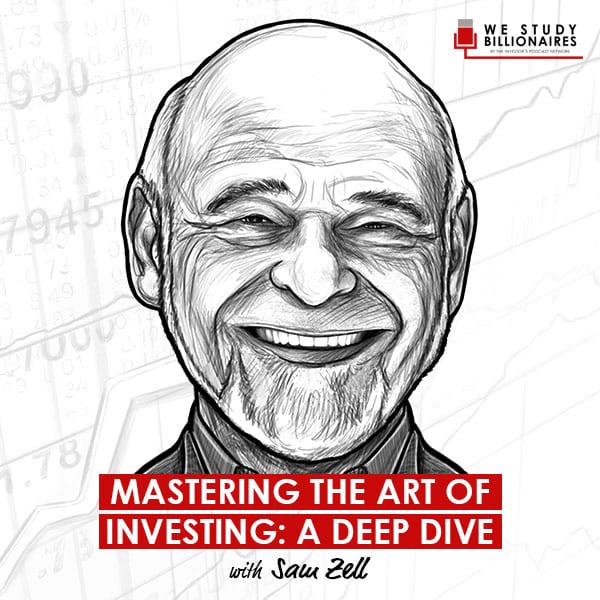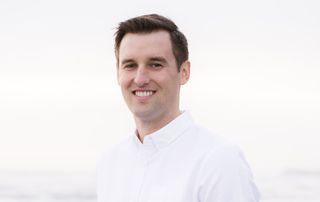Learning from Sam Zell
Introduction
Real estate is something I've become very interested in learning more about the last four years. That path led to discovering Sam Zell, from understanding his impact on real estate and learning about his business philosophies.
It was sad to hear of his passing. In a world where so many in business speak like politicians and robots...his candid style was refreshing. He had an eye for telling when “distressed” meant undervalued as opposed to on its way to zero. I've found his insights original, fundamental, and inspiring. Some of my favorites are shared below.
In the middle of the pandemic when I was thinking about making our first real estate investment, this insight helped me see things clearly:

Rest in peace.
Source: David Senra
Overview
Sam Zell was the founder and chairman of Equity Group Investments, a private investment firm which started in the real estate. His nickname was “the Grave Dancer” since he was often a distressed asset investor.
As a college student at Michigan, Sam approached a local apartment owner, asking him to manage his 15-unit building in exchange for one thing. Free room and board. By the time Zell graduated college, his building management ventures were netting $150,000.
Sam said knowing the rules of the game gave him his greatest advantage, even though he admitted to hating every second of law school. He studied law at Michigan while continuing to build. Zell was managing 4,000 apartments by the time he got his JD.
In the ‘70s and ‘80s most investors made money from buying and flipping properties. Sam held on to them for the long-term. It helped him invent the Real Estate Investment Trust (REIT). A collection of income-generating properties that investors can buy fractional shares of.
After accumulating office buildings for decades Sam cashed out with perfect timing, selling Equity Office for $39B in 2006. It was the largest LBO in history at the time.
Sam's Insights
On Life
“The first thing you need to understand is how little you know.”
"Retirement from what? I don’t understand that, because I’ve never worked in my life. I’ve just done stuff that turns me on."
“I grew up believing that anything is possible. And when you’re not aware there are any limitations, nothing stops you from trying.”
“I tell my kids and grandkids, “Your responsibility is to maximize the skills you were given. But whatever you decide to do, invest everything you have in it—excel. What I’ve done is not the example I wanted to set; it’s the way I’ve done it that I hope you emulate, through focus, effort, and commitment.” And perhaps best of all… “if you’re really good at what you do, you have the freedom to be who you really are.”
“When everyone is going right, look left.”“I‘ve spent my whole life listening to people explain to me that I just don‘t understand, but it didn‘t change my view. Many times, however, having a totally independent view of conventional wisdom is a very lonely game.”
“With today’s access to an overwhelming amount of information, most of it drivel, you have to focus on what’s meaningful.”
"Don't get caught up in owning a bunch of s***. It's just like you're just going to keep buying nicer versions of the same stuff."
"Keys to success? Number one, I always seemed to have a lot of self-confidence so I didn‘t pay attention to conventional wisdom. Number two, you may have heard the quote, 'common sense isn't so common,' I‘ve always been a great believer in logic."
On Hiring and Business
“There’s a baseline IQ level needed to work at my firm, but I don’t need rocket scientists. After that, what best predicts your success in my world is drive, energy, attitude, judgment, conviction, and passion . And an ability to cut to the center of an issue. I’d trade another twenty IQ points for those qualities any day.”
“When I interview new candidates for jobs, the first question I always ask them is “How hungry are you?”Hunger equals drive — an ever – present alertness that is always reaching , always stretching. It is priceless.”
“I often say I’m chairman of everything and the CEO of nothing. I stick to what I’m good at—vision, direction, strategy. That’s where I add the most value. I spend almost my entire day listening to other people. I ask questions, I probe, I raise possibilities.”
“I believe the fundamentals of business—supply and demand, liquidity equals value, good corporate governance, and reliable partners, to name a few—apply across the board.”
“When you’re a repeat player, when your world is your business and your business is your world, it’s all about long-term relationships. In any negotiation I believe in leaving a little bit on the table. And in any relationship I believe in sharing the stakes.”
“There’s no substitute for limited competition. You can be a genius, but if there’s a lot of competition, it won’t matter.”
“Listen, business is easy. If you’ve got a low downside and a big upside, you go do it. If you’ve got a big downside and a small upside, you run away. The only time you have any work to do is when you have a big downside and a big upside.”
"My success has been related to being a very good observer, having opinions and being willing to implement them, and understanding and believing in the Bernard Baruch saying ―nobody ever went broke taking a profit."
"I start by not paying much attention to the market. I think the Street reflects the value of the last share traded, but the true value of the asset may be more or less than what's indicated publicly."
"Because I was a summer employee, I got all of the worst assignments. If you never sold anything through cold calls or without appointments, it may be hard to imagine, but I can promise you that it's humbling. Most responses are no. Some empathetic. You just build up a tolerance, for rejection. You learn to keep asking and find ways to get a conversation going. If you can just start and keep a dialogue, you have a chance."
On Supply and Demand
“On one of my walks I discovered a newsstand underneath the “L” tracks. It was 1953, and a provocative new magazine called Playboy had just made its debut featuring Marilyn Monroe on the cover. It sold for 50 cents. I bought a copy and thought it was terrific. So I brought it home to Highland Park, where it wasn’t for sale, and showed it to my friends. One of them offered to buy it. “Three bucks,” I said. After that, I started a little magazine import business and, in the process, learned a lasting business lesson: Where there is scarcity, price is no object. This basic tenet of supply and demand would later become a governing principle of my investment philosophy.”
“I would tell you whatever business I’ve been in — real estate, barges, rail cars — it’s all about supply and demand.” “When there is no supply, real estate performs very well. Almost without regard, within reason to the economic conditions. When there is over supply, it doesn’t matter what’s going on real estate is going to suffer.”
“Opportunity is very often embedded in the imbalance between supply and demand. It could be rising demand against flat or diminishing supply, or flat demand against shrinking supply. When there’s an imbalance, I look at where the two lines will intersect and then determine whether it is cheaper to buy or to build. Usually the answer is in acquisition, which eliminates a lot of the risk inherent in development.”
On Real Estate
“The most reliable measure of our buildings’ value remained—and had always been, in my opinion—replacement cost. Replacement cost mattered more to me than rents or comparable prices or vacancies or economic growth or stock price. This was because replacement cost determined the price of future competition.”
“You can have all of the assets in the world you want, but if you have no liquidity it doesn’t matter.”“Liquidity equals value. At no time in my career has it ever been more clearly brought home to me than in the (2008)-09 period. If you had liquidity, you had value. … Everything comes down to liquidity, everything comes down to exit strategies, everything comes down to knowing when you get in how you are going to get out.”
“The problem with leverage is that you need to pay it back. The biggest measure of success or failure is how entrepreneurs address and deal with leverage. If you are in the real estate business without leverage, that’s like being a boxer in the ring without a glove.”
“Anytime you don’t sell, you buy. So if we had chosen not to sell Equity Office for $39 billion, we would be buying Equity Office for $39 billion.”
"You must make the judgment in advance as to how much downside risk you are willing to take. I knew that I could always survive the good days, but the critical element is to be able to survive when the market isn’t doing well or the investment isn’t performing."
On Entrepreneurship
“Entrepreneurs basically not only see the opportunities, but also the solutions. A critical element to a successful entrepreneur- he or she thinks in themes, not in single events. I don’t know too many insecure successful entrepreneurs. Fear and courage are very closely related. Anybody who does not understand fear does not know courage. Entrepreneurs don’t fail – things sometimes just don’t work out. But, that’s it. Entrepreneurs don’t just deal with risk, they have risk appetite. They look for change that will make the difference. An entrepreneur is a guy who thinks outside of the box, a person who does not accept the conventional. He constantly asks ‘what if?’, ‘could I?’, or ‘should I?’” There is a Confucian saying: ‘The definition of a schmuck is someone who reached his goal.’ Entrepreneurs always keep going – they never stop. It is lonely being an entrepreneur. Often, you turn around and ask: where is everybody?"
"I philosophically believe that if you can't delineate your idea in one or two sentences, it's not worth doing. . . my criterion is if they can't concisely explain their idea, then I throw them out of my office and tell them to come back when they can. Simplicity is critical."
"My real compensation for my job as a traveling salesman wasn’t monetary. It was getting comfortable with rejection. Indifference to rejection is a fundamental part of being an entrepreneur."
Further Reading and Listening





Andrew Ritchart Newsletter
Join the newsletter to receive the latest updates in your inbox.





